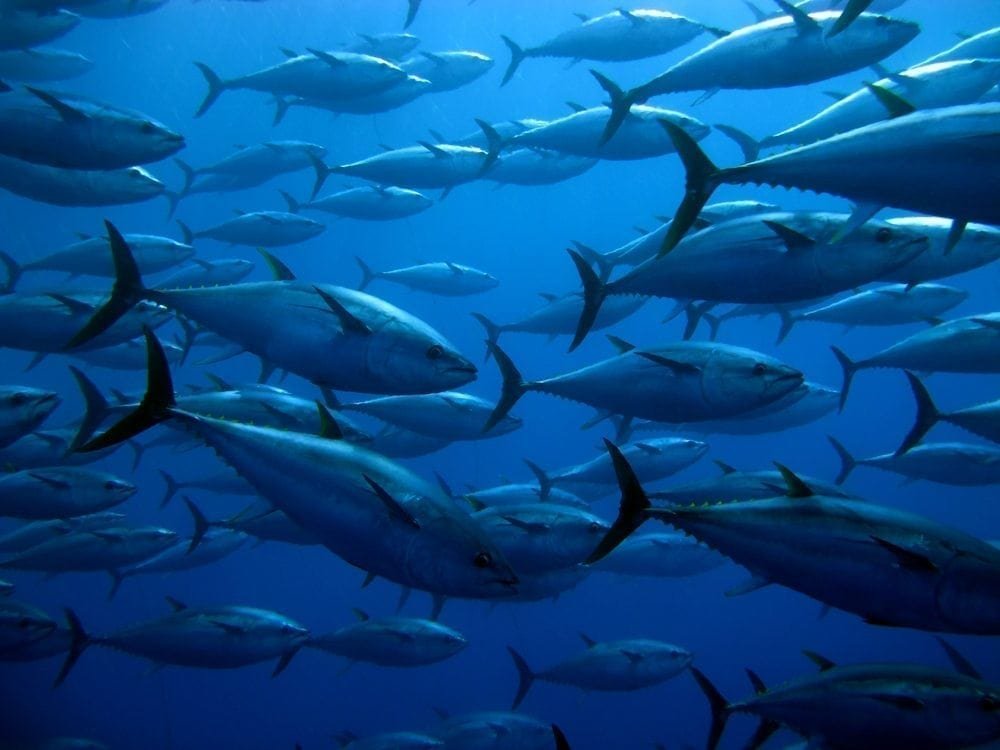Greenpeace’s 2015 tuna league table https://secure.greenpeace.org.uk/page/s/not-just-tuna sees the UK’s largest tinned tuna brand, John West, sink to the bottom of the ranking: a woeful 98% of its tuna is caught using destructive and unsustainable fishing methods.
Fishlove – celebrities pose with fish to raise awareness of overfishing
Dirty tuna fishing
After promising consumers back in 2011 that 100% of its tuna would be sustainable by 2016, John West has managed only a dismal 2% – with nearly all of its tuna caught in nets using so-called Fish Aggregating Devices (FADs) which indiscriminately kill a host of other marine life, including sharks and even endangered sea turtles.
’No intention’ of keeping promise
Ariana Densham, Oceans Campaigner at Greenpeace UK, said John West is ‘plumbing the depths of irresponsibility.’
‘In 2011 John West guaranteed consumers its tuna would be 100% sustainable by 2016 – but with little over a year to go, a pathetic 2% of its tuna is caught in a way which minimises harm to other marine life. It’s clear John West has no intention of keeping its sustainability promise.
‘It’s a great achievement that all major supermarkets in the UK now only use fully sustainable tuna in their own brand products, caught using the pole and line method or in nets without FADs, which minimises harm to other animals. But John West continues to plumb the depths of irresponsibility – flooding our shelves with cheap tuna which comes at a huge cost: the indiscriminate killing of marine life. It’s also undermining the world-leading standard set by UK supermarkets.
‘The tide is turning on companies which sell unsustainable tuna and unless John West keeps its promise to UK consumers to stop using destructive fishing methods, it will find itself cast adrift.’
Ariana Densham, Oceans Campaigner at Greenpeace UK
Top scorers
Greenpeace’s Tuna League Table 2015 saw strong results from Waitrose, Marks & Spencer and Sainsbury’s (placed first to third, respectively), as well as great progress from Tesco, which jumped up the rankings to fourth place.
‘We are delighted that our efforts in ensuring we offer sustainable and ethical tuna to customers has been recognised. All of our canned tuna is pole and line caught and clearly marked as Marine Stewardship Council certified, including all the tuna in ready-prepared products such as sandwiches and pâtés.
‘In addition all skipjack tuna used as an ingredient in any Waitrose product is also Marine Stewardship Council certified. Sustainability is at the very heart of what we do and we are proud to be market-leading.’
Jeremy Ryland Langley, Waitrose Aquaculture and Fisheries Manager
Aldi & Lidl
For the first time, Greenpeace included fast-growing budget supermarkets Aldi and Lidl – which performed very differently.
Aldi entered the ranking in a solid fifth place, with a good sustainability record in its own-brand products, while Lidl languished in ninth – the lowest placed supermarket – just ahead of the big brands Princes and John West.
‘We are pleased to receive this recognition from Greenpeace for our tuna policy. Sourcing fish in a responsible way is really important to us and to our customers. We work with our suppliers and a range of organisations, such as Greenpeace, the Sustainable Fisheries Partnership and the Marine Stewardship Council, to drive continuous improvements for fisheries and aquaculture.
‘Having met our 2016 target a year early, Aldi UK and Ireland now sources all canned tuna using only responsible methods that minimise the impact on endangered species, such as sea turtles.’
 Play Video about This Rock Might Just Save The World
Play Video about This Rock Might Just Save The World Play Video about Play 2 hours of rock
Play Video about Play 2 hours of rock Play Video about Play 2 hours of brook
Play Video about Play 2 hours of brook Play Video about Play 2 hours of sheep
Play Video about Play 2 hours of sheep











































